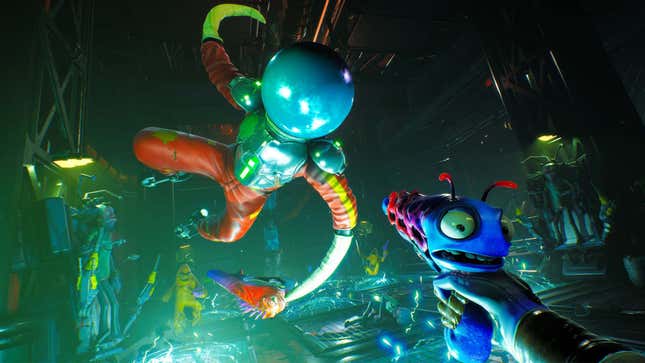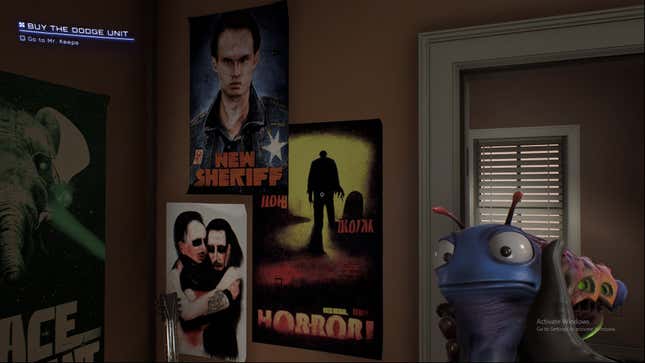
As the debate around AI “art” continues to rage on sites like ArtStation, Twitter, and Reddit (and likely in the comments below this very article) it’s already being used in commercial projects. Most recently, Justin Roiland of Squanch Games and Rick And Morty fame confirmed that his newest project, the comedic first-person shooter High on Life, used a machine-learning algorithm to create poster art and even a vocal performance.
So-called AI art has quickly become a hot topic among artists and creators online as it’s become easier than ever to just type a few words and get back detailed (and sometimes even nice-looking) digital images. AI art isn’t really art as we commonly define it, as it wasn’t created by humans and is just a mess of digital bits and bobs ripped from existing images—often without permission from the original artists—that are arranged in a way that sort of looks like how something a human artist might create. And in a world where it’s harder than ever for artists to make a living, AI art has the potential to destroy a lot of lives, careers, and futures. In response, AI tech bros and their associated weirdos say, “lol okay boomer, keep up!” Now the tech has been used in a video game and…I’m so tired of being tired of it all.
In an interview with Sky News, Justin Roiland confirmed that his studio Squanch Games used the AI art tool Midjourney AI during High on Life’s production to add some “finishing touches” to the world. While not confirmed in the interview directly, folks on Reddit have spotted many posters in the game that appear to be created using AI art tools. (You can tell because they look as if the “person” who made them has no idea what a human being or printed words look like.)

“It makes the world feel like a strange alternate universe of our world,” explained Roiland to Sky News. “And we used it to come up with weird, funny ideas.”
Roiland did say that most of the art in High on Life is hand-crafted by people. But it also sucks that we live in a timeline in which that’s even a thing you have to confirm; that the art in your game was made by people and not a text prompt. Further, lead designer Erich Meyr told Sky News that they used AI to prototype character voices, and that one “minor” role in the game actually remained voiced by AI.
“I don’t know what the future holds, but AI is going to be a tool that has the potential to make content creation incredibly accessible,” Roiland continued. “I don’t know how many years away we are, but all you will need to be is somebody with some big ideas.”
Ignoring that Roiland states that AI is used to come up with ideas and also is for people with ideas, I’m disappointed to see AI art so quickly infect video games. But I’m not surprised. The video game industry has long treated its artists like machines that can run for 14 hours a day for weeks at a time. And rarely do devs or artists get paid fairly. So it’s a no-brainer that game studios and publishers will be some of the first to replace workers with algorithms and various “AI”-enabled tools as fast as possible.
Read More: AI Creating ‘Art’ Is An Ethical And Copyright Nightmare
Of course, some will jump into the comments to explain that AI art is actually great, people who create it using prompts are artists and automation is just a natural part of civilization and technology. And to those people, I say: “Come on, really? Come on.”
Look, if we lived in a world in which universal basic incomes were common, medicine and food were free, and we had safety nets in place to make sure everyone can live a happy and healthy life, I’d be more okay with AI art and similar tools potentially replacing traditional careers and jobs. But that’s not the case. Until it is, more automation will lead to more people struggling to survive. The forward march of technology may be hard to stop but that doesn’t mean it’s universally correct, ethically sound, or something we should just let happen. Even if you truly believe “AI-created art” is good, that still doesn’t mean we have to accept the immense toll it will take on actual living humans as our future.